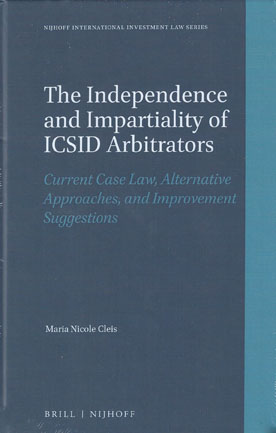
The legitimacy of investor-State arbitration is a much-debated topic, with arbitrators’ independence and impartiality being one of the core concerns. In The Independence and Impartiality of ICSID Arbitrators, Maria Nicole Cleis explores how unbiased decision-making is ensured under the ICSID Convention. Juxtaposing existing disqualification decisions in the ICSID system against corresponding requirements in related dispute settlement systems, the book convincingly argues that the current approach to disqualification requests against ICSID arbitrators is too exacting in light of the high stakes of investor-State disputes. The author’s nuanced analysis of the status quo is followed by novel suggestions for reforms (including a proposal for ICSID-specific guidelines on conflict of interest), making the book a valuable source of ideas on constructive paths forward.